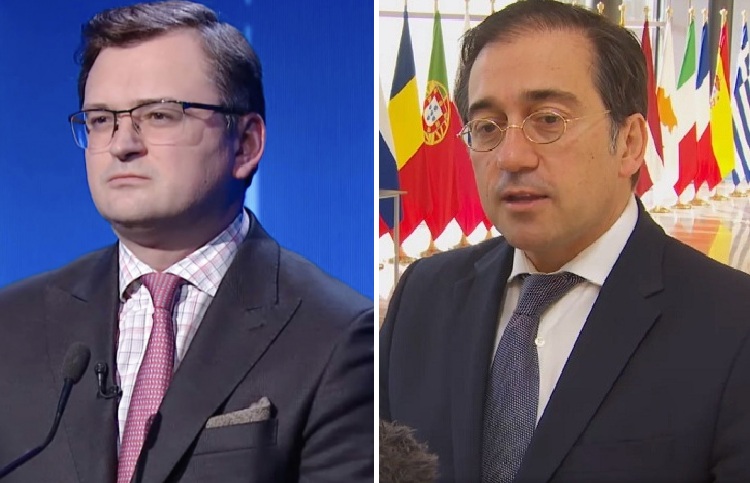Eduardo González
The Minister of Foreign Affairs, José Manuel Albares, will be received today in Kiev by his Ukrainian counterpart, Dmytro Kuleba, to whom he will convey “Spain’s solidarity” with his country in the face of Russia’s military and political pressures, as announced yesterday by the head of diplomacy himself shortly before leaving for Ukraine.
The visit of Albares, which takes place at the invitation of Kuleba after the telephone conversation held by both of them last week, includes a bilateral meeting and a trip to the Ukrainian border with Russia to observe the situation on the ground. Once his activities in the country are concluded, the minister will travel to Lyon, France, to participate in the double meeting of European foreign and health ministers, convened by the French Presidency of the EU, and to hold a meeting with his French counterpart, Jean-Yves Le Drian, with whom he will discuss, among other issues, the crisis in Ukraine. On Thursday, Albares will travel to Brussels to meet with the Secretary General of NATO, Jens Stoltenberg, and with the EU High Representative for Foreign and Security Policy, Josep Borrell.
All this activity by Albares comes amid a major intensification of diplomacy to try to reduce tension between Russia and Ukraine. Last week, Ukraine received visits from the prime ministers of the United Kingdom, Boris Johnson; the Netherlands, Mark Rutte; and Poland, Mateusz Morawiecki; and Kuleba himself had a telephone conversation with U.S. Secretary of State Anthony Blinken on Friday. Kuleba also received German Federal Foreign Minister Annalena Burbock on Monday, and French President Emmanuel Macron visited Kiev yesterday to meet with Ukrainian President Volodimir Zelenski, just a day after holding a five-hour meeting in Moscow with Russian President Vladimir Putin. Traveling with Macron was Jean-Yves Le Drian, who was received by Kuleba. The foreign ministers of the Czech Republic, Jan Lipavsky; Austria, Alexander Schallenberg; and Slovakia, Ivan Korchok, also traveled to Ukraine this week.
Therefore, according to Albares, “the crisis in Ukraine is relieving a high-intensity diplomacy” whose objective is to promote that “dialogue and diplomacy are the ways to resolve any conflict with Russia”. “All channels for dialogue are open,” he continued. “War is not even being considered as a hypothesis,” he added. “No one is preparing a war” and, therefore, “Spaniards should not be worried with a scenario that is not on the table,” he warned.
Last week, Russian Foreign Minister Sergey Lavrov sent a letter to his counterparts from EU states (including Spain), the US and Canada to ask for an “individualized” response on the European security architecture and the possible eastward enlargement of NATO. In the same letter, Lavrov recalled that the concept of security in Europe is based on “the right of each state to freely choose its military alliances” but also on “the obligation of each state not to strengthen its security at the expense of others”, as explained at a press conference by the Russian Ambassador to Spain, Yuri Korchagin.
In this regard, diplomatic sources confirmed yesterday that Albares had received the letter, but did not specify either its exact content or his reply. They also assured that Spain is acting in a coordinated and united manner with its EU partners and NATO allies, despite Moscow’s interest in dealing with this issue bilaterally with each state. In this sense, the sources said, all EU countries are maintaining unity with regard to this crisis, which has probably surprised Russia itself.






